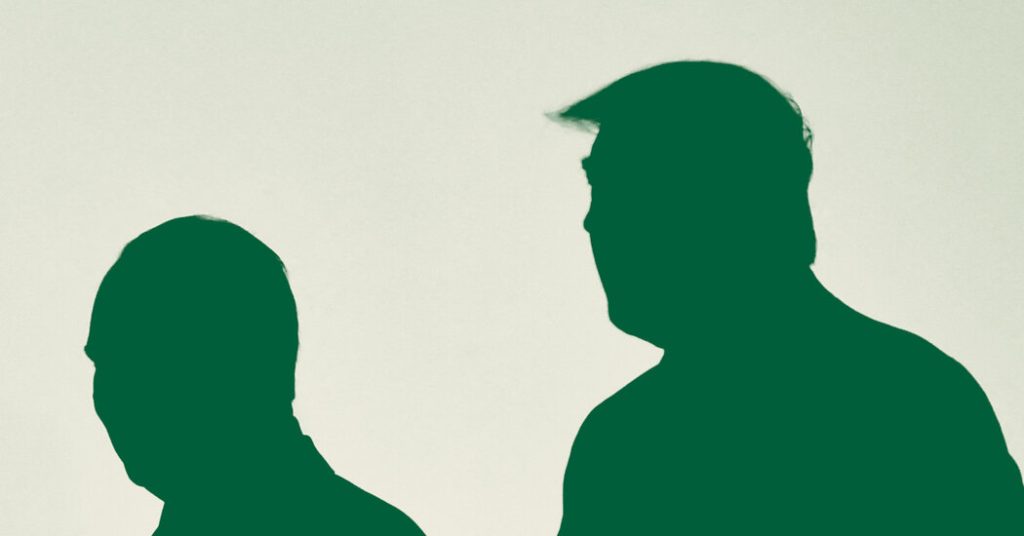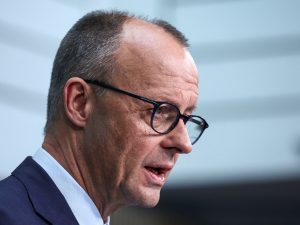The Trump administration may be considering negotiating a peace deal with Russia that would end the war in Ukraine. “No American president in the last 80 years and probably 100 years before that would have made this bargain,” Kori Schake, the director of foreign and defense policy studies at the American Enterprise Institute, tells the Opinion columnist David French.
Below is an edited transcript of an episode of “The Opinions.” We recommend listening to it in its original form for the full effect. You can do so using the player above or on the NYT Audio app, Apple, Spotify, Amazon Music, YouTube, iHeartRadio or wherever you get your podcasts.
David French: Trump’s foreign policy strategy so far has largely involved alienating or attacking America’s long standing allies while embracing Vladimir Putin.
I think we’re all coming to terms with Donald Trump’s turn against Ukraine.
Audio clip of Donald Trump: A dictator without elections, Zelensky better move fast or he’s not going to have a country left, gotta move, gotta move fast.
News Clip: Ukrainian president Vladimir Zelenskyy is appealing to the Trump administration as the U.S. looks to thaw its relationship with Russia.
Clip of Trump: We’re successfully negotiating an end to the war with Russia, something I’ll admit only Trump will be able to do in the Trump administration.
I’ve been deeply alarmed by this turn of events, and the best person I could think of to talk to about this with is Kori Schake. She’s the Director of Foreign and Defense Policy Studies at the American Enterprise Institute, a conservative think tank. She also worked at the State Department, the Department of Defense and the National Security Council.
Kori and I have discussed foreign policy before and I wanted to get her perspective on Trump’s shift toward Russia and against Ukraine. I’m also going to ask her if the Republican Party has really permanently changed its foreign policy position.
Kori, thank you so much for joining me.
Kori Schake: It’s a great pleasure, my friend.
French: You’re joining us after a week in which we’ve probably seen more dramatic diplomatic developments in the Ukraine conflict than in the past couple of years.
Before we dive into all of the twists and turns, it might be helpful to take a step back and remind listeners why so many of us care about Ukraine’s fate and the fate of its people — why this matters not just for Ukraine’s national security, but for the United States as well.
Schake: I would say two things, David. First there is honor in standing alongside people fighting for their freedom and human dignity.
For the last hundred years the United States has viewed American foreign policy as a way to make our country safer and more prosperous by supporting and expanding freedom in other countries. Free societies may fight many wars, but they don’t fight each other. An example of two democratic countries fighting each other is Iceland and Britain — a couple shots fired about fishing rights.
Ukraine’s safety portends greater safety, not only in Europe, but beyond.
French: Let’s briefly discuss Vladimir Putin’s ambitions, because many people view this war as extremely limited. In other words, if Putin gets what he wants in Ukraine, driven by his animosity toward Ukrainian independence, there wouldn’t be broader implications of Ukrainian defeat.
Schake: I agree with you, that’s a mistake. Putin believes there is no such thing as Ukraine — no such culture — therefore they deserve to be subjugated by Russia.
It’s not just Ukraine — Putin feels the same about NATO members Latvia, Lithuania and Estonia. Russia has historically viewed Poland in the same light. What we’ve seen Russia doing in Georgia, Moldova, and Ukraine is part of a pattern over the last 15 years. I don’t think we should have confidence that conceding Ukraine to Russian villainy is going to satisfy Russia’s appetite.
French: So, Kori, what’s the current state of the war right now?
The perception is that Russia is moving forward slowly but steadily, at a terrible cost to itself. We know Ukraine is under pressure, and Russia is losing many men, but what’s the actual state of the conflict? Is there a way we could say definitively who’s winning or losing at this moment?
Schake: No, we can’t definitively say it. But here’s the situation: Russia controls Crimea and much of the Donbas, and the oblasts of Luhansk, Donetsk, and Zaporizhia. Ukraine holds a small portion of Russian territory. Russia is slowly, steadily making advances further into Ukrainian territory, but at about half the pace they were in the fall. Their momentum is slow and is slowing further. Russia has taken more than 600,000 casualties and is having to pay increasing prices in order to get recruits. Meanwhile, North Korea has lifted the manpower constraint by offering their own soldiers to fight.
Iran and China are supplying commercial and military materials to Russia. Ukraine has inflicted 600,000 casualties on Russia and is fighting the Russian army to a large standstill — for 4 percent of the U.S. defense budget in the last three years. That’s a great investment in the security of the West.
French: Let’s walk through the options going forward. What are Ukrainian defense capabilities if the Trump administration exerts maximum leverage, meaning, tries to strip Ukraine of all U.S. support and funding. Can Ukraine stay in the field without us?
Schake: Yes, they can, but they won’t be able to fight the way they are fighting now.
The truth is, sand is slipping through the hourglass for both Ukraine and Russia. Russia has already used about half of the entire tank and armored personnel carrier stockpile the Soviet Union accumulated since the 1940s. The main way they’re inflicting damage on Ukraine is through long range strikes on civilian population centers and energy production.
They’re trying to freeze and darken Ukraine into submission. Without American assistance, Ukraine won’t have the air defenses to protect their civilian population. They will likely still have the ability to fight on the conventional battlefield. Two-thirds of the Russian casualties are now being caused by drones, which are domestically produced by Ukraine’s defense industry. It’s not necessarily a positive sign, though. The fact that drones are so destructive suggests that Ukrainian infantry and tanks aren’t being as effective.
French: So, into this situation steps the Trump administration, and over the last week we’ve seen really a frenzy of diplomatic activity globally, a shift in posture toward our own allies, and a change in posture toward Russia.
Let’s break this down into separate parts. First let’s talk about the Trump administration’s posture right now toward Russia. I believe there was a Russian lawmaker who said after the initial Trump Putin call that the diplomatic blockade has been broken. Meaning a diplomatic blockade.
So, what’s the substance of the Trump administration’s overture toward Russia?
Schake: I certainly think Trump’s policy is trending toward what he views as a great power condominium — where the U.S. and Russia are making deals about European security without involving European countries.
The most recent indicator of this is the Trump administration’s refusal to allow the term “Russian aggression” in a G7 communiqué, issued by the world’s most powerful economies. Early signs suggest the Trump administration is prepared to compromise the sovereignty of Ukraine in order to benefit Russia, and that’s shameful. No American president in the last 80 years, and probably not in the 100 years before that, would have made such a bargain.
The economic sanctions on Russia are truly constricting, and it’s likely Russia cannot sustain the war effort through 2025 in its entirety. This means that Donald Trump is on the verge of losing Ukraine and benefiting Russia, a country that is a major destroyer of the international order that has kept the United States safe and prosperous.
French: We’ve also seen obvious overtures toward Russia, including hints or implication that a new economic relationship between the United States and Russia could be on the horizon. At the same time, we have seen this extraordinary turn against our European allies.
JD Vance gave a speech in which he scolded many of them on free speech issues. While I’m not a defender of Western European free speech regimes, the focus on that, relative to the gravity of Russian aggression in Europe strikes me as disproportionate.
So, what is the current posture of the Trump administration toward our allies and NATO right now?
Schake: I think this is unchanged in kind, only in degree, from Trump’s first term. President Trump has long mistakenly believed that America’s allies are leeches on the nation’s strength, rather than seeing them as a major source of American power internationally.
No dominant power has ever received as much voluntary assistance as the United States does from its allies helping us pursue our goals across the globe. It’s really shocking that President Trump is squandering the good will that American idealism and policy have bought for our country over the past 80 years.
Literally everything we try to accomplish in the world is going to get harder and more expensive because countries won’t trust us to advance common interests.
French: Let me try to steelman a Trump position here and get your reaction to it. We understand that the Western alliance has benefited us in many ways, but we also believe that we’ve been exploited by it. A percentage of NATO countries don’t meet the two percent defense spending target. Many have had more than two years since Russia’s invasion of Ukraine to ramp up their own domestic arms production, yet many of them haven’t done it sufficiently. We face a growing challenge from China, and while we are powerful, we aren’t infinitely powerful. It makes sense to begin to move our emphasis of our national defense strategy to the Far East, where we’re more vulnerable to a rising China, and leave Europe, which has the capacity to support Ukraine, to take on more responsibility. If they really care, they’ll need to step up now.
Schake: That’s true as far as it goes. Europeans collectively have an economy ten times the size of Russia. If the Ukrainian army can fight the Russians to a near standstill, imagine what Poland and Finland could do together. Russia would unquestionably lose that war.
But that’s only part of the story. To affect China’s choices at an economy-of-scale level, we actually need the help of European countries. We need their export controls, market access provisions, investment restrictions and their willingness to send military forces to the Pacific.
It’s increasingly doubtful whether Europeans, who are fearful about abandonment by us, will believe they have the bandwidth to do anything we need if they don’t feel like we’re willing to help them.
French: Let me ask you about the current state of what passes for negotiations. We’ve seen a meeting between American and Russian diplomats, but Ukraine has not been at the table yet. Zelensky has indicated he’s not going to consider any agreement unless Ukraine is part of it. Still, there have been some talking points and basic provisions outlined for a potential deal between the U.S. and Russia.
The outlines appear to be that the U.S. is acknowledging that it’s not feasible to ask Russia to give up any territory that it has already taken. It also appears to be willing to guarantee that Ukraine won’t join NATO. There’s also talks about forcing elections in Ukraine.
Let’s take these points in reverse order.
First, let’s talk about the idea of forcing elections. The reason I bring this up, Kori, is that when I talk to politically informed citizens who are following this, many of them have immediately said: What’s wrong with elections? I didn’t know Zelensky isn’t standing for re-election right now. What’s going on? Why would we be supporting a country that’s not holding elections?
So Kori, let’s take a moment to talk about this. Why haven’t there been elections? Why would that be a problematic point of a deal to begin with?
Schake: They’re not holding elections because the Ukrainian constitution, which predates Russia’s invasion, prohibits elections during wartime. For perspective, Great Britain didn’t hold elections during World War II. So if Zelensky is a dictator, then Churchill was one too, while fighting for Western freedom.
But there’s also a second part of the argument: About 20 percent of Ukraine’s territory is under Russian occupation. How can you hold a free election in areas controlled by Russia, where people fear for their lives to express their political preferences? It’s not just Zelensky’s government that opposes holding elections during wartime. The opposition doesn’t want to hold elections because they don’t see how it can be fairly constituted.
It’s similar to suggesting that Abraham Lincoln should have held elections in the seceded Confederate states during the American Civil War. How do you organize and ensure that those elections can happen freely?
French: Let’s discuss this other point of Ukrainian neutrality. I would say there’s a spectrum of Ukrainian alliance with the larger West. On one end, the most aligned position would be a member of NATO. On the other hand, there are security guarantees that could be exclusively European, such as the Brits have indicated that they would be willing to put boots on the ground in the event of a cease-fire to try to maintain deterrence and a peace. This would involve a European security alliance, but not necessarily NATO.
Within that spectrum, do you think there is a settlement that could be acceptable? One that stops short of NATO membership but still brings Ukraine into a European security framework? And the second part of that question: When you hear the word neutrality, I think many people imagine a country like Switzerland. But Vladimir Putin has a different definition of neutrality, one that equates to subservience. How much flexibility do you think there should be in how Ukraine is brought into a Western security framework?
Schake: I think it’s understandable that Western governments are anxious about including Ukraine in NATO while Ukraine is fighting NATO’s major adversary, Russia. This is because Article V of NATO’s treaty guarantees that an attack on one member is considered an attack on all. The second point is that it was Ukraine’s desire toward joining the European Union in the first place that caused Russia to try and crush Ukraine.
It’s not a security issue that caused Russia to try and vanquish Ukraine. It was fear that Ukraine’s transition to becoming a free and prosperous Western country was so frightening to Vladimir Putin because the Russians might demand that for themselves. It’s the color revolution fear that’s driving Vladimir Putin. So I don’t think there is a European option that puts Ukraine in safety.
When Ukraine was neutral, in 2014, Russia invaded it for the first time. So I don’t think neutrality is a stable outcome. There’s a historical precedent. West Berlin was vulnerable, it was both indefensible and crucial to defend from 1945 to German unification in 1990.
And what we in the West believed was that defending Berlin was important to prevent Germany from becoming neutral, because a powerful neutral state in the center of Europe was an invitation to Russian and Soviet aggression.
French: Let’s move to the G.O.P. itself, because this is one of those areas where you will actually see Republican members of Congress openly disagree with the president in a way that you don’t on many domestic issues.
We have seen some open disagreement, where they might not directly criticize President Trump, but they might say: Stand with Volodymyr Zelensky. Or they might openly side with Ukraine and openly talk about how Vladimir Putin is a war criminal. So, is the foreign policy fight in the G.O.P. truly settled? Is it truly over, and this is just sort of the last gasps of the Reaganite remnant? Or is there still an actual battle going on? Is this a situation where there is actually hope that members of Congress — of Trump’s own party — will stand up to him on this issue?
Schake: Boy, I hope and believe the fight isn’t over. I think Republicans are beginning to find their footing after the disorientation of the number of ways in which President Trump and his administration have overturned traditional conservative positions and policies.
But I have to say, David, sometimes I feel like a saber-toothed tiger in a tar pit, as a Reagan Republican. I do worry, though, that foreign policy is one area where the president has the widest autonomy.
There are very few ways that Congress or civil society can prevent a president from making foreign policy decisions. Where Congress, especially Republicans in Congress, have stronger leverage is on defense policy. That’s where the authorities belong to Congress and that’s where the money belongs to Congress.
The last thing I’ll say about the foreign policy debate in Congress is that I was more hopeful before Republican senators voted to confirm Tulsi Gabbard, a clear counterintelligence vulnerability for our country, to lead the 18 intelligence agencies. And before so many Republicans voted to confirm Pete Hegseth as Secretary of Defense.
French: Why precisely would somebody say that Tulsi Gabbard, a presidential appointee confirmed as director of national intelligence, is a counterintelligence risk?
Schake: There are three reasons. First, her judgment is unsound. She traveled to Syria to meet with Bashar al-Assad and denied that Assad used chemical weapons against the Syrian public, in spite of all 18 American intelligence agencies reporting he did so.
I think putting somebody in charge of the intelligence community who willfully refuses to acknowledge the conclusions of the agencies and the basis for those conclusions means that she is somebody who is not going to make fair judgments about emerging or existing threats.
The second reason I think she should not have been confirmed is she was asked during her hearing whether Edward Snowden was a traitor to the United States of America. She refused to acknowledge that the thousands of documents revealing sources and methods of American intelligence gathering and assessments constituted treason.
And the third reason I think she is unsound is that she has been parroting Russian talking points about Ukraine and about the United States for years.
Audio clip of Tulsi Gabbard: You hear President Biden say: Well, this is Putin’s war, this is Putin’s fault. The United States and some of the European NATO countries are fueling this war.
Audio clip of Gabbard: What you do hear is warmongers arguing that we must protect Ukraine, because it’s a quote unquote democracy. But they’re lying, Ukraine isn’t actually a democracy.
All three of those things should have been the basis for rejecting the advice and consent of the Senate to her confirmation, and will be continuing vulnerabilities and risks. They also give reason for America’s allies — which provide the strategic depth of intelligence gathering and assessment — to not share their information and their assessments with the United States.
French: Kori, you’ve been very generous with your time, and I really appreciate it. But before we go on, I’m going to ask you for a prediction. Four years from now, where do you think Ukraine will be?
Schake: Four years from now, I think Ukraine will still be fighting to try and push Russia out of currently occupied territories.
French: The war still continues four years from now?
Schake: Yes. I don’t see how any Ukrainian government, whether under President Zelensky or anybody else, could consign Ukrainian people and Ukrainian territory to the depredations and war crimes Russia has imposed on them.
I think Ukraine will continue to fight, with or without our assistance. With or without European assistance until they drive Russia out of Ukraine’s internationally recognized territory.
French: Well we’re going to end here on a point of strong agreement, because you and I traveled to Kyiv together and we saw the will of the Ukrainian people firsthand. I can’t see them surrendering their sovereignty because Donald Trump tells them to.
Schake: Exactly right, David.
French: Thank you, Kori. I very much appreciate your time.
Schake: It was a great pleasure. I very much appreciate the good work you do.
Thoughts? Email us at theopinions@nytimes.com.
This episode of “The Opinions” was produced by Vishakha Darbha. It was edited by Alison Bruzek and Kaari Pitkin. Mixing by Sonia Herrero. Original music by Pat McCusker, Carole Sabouraud, Isaac Jones. Fact-checking by Kate Sinclair and Mary Marge Locker. Audience strategy by Shannon Busta and Kristina Samulewski. Our executive producer is Annie-Rose Strasser.
The Times is committed to publishing a diversity of letters to the editor. We’d like to hear what you think about this or any of our articles. Here are some tips. And here’s our email: letters@nytimes.com.
Follow the New York Times Opinion section on Facebook, Instagram, TikTok, Bluesky, WhatsApp and Threads.







